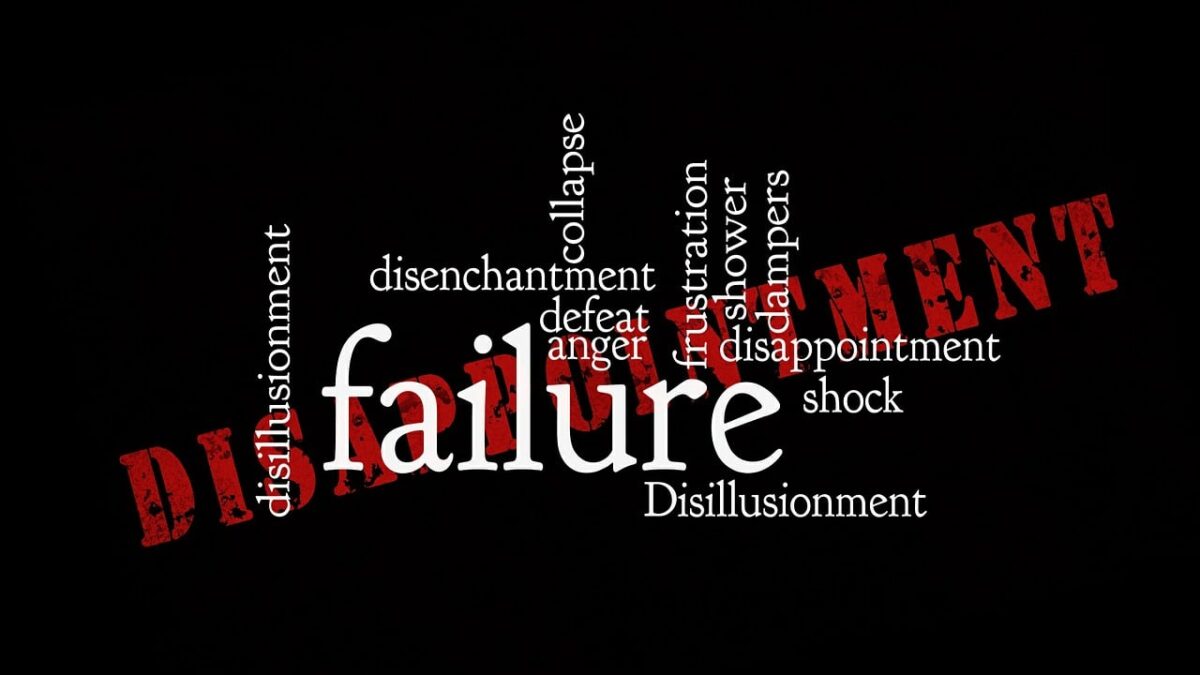
Conflict is always an opportunity
16/04/2025
Self-leadership: the secret weapon of productivity
30/05/2025What to learn from failure is the question that kicks off this article.
No one is free from failure
Even Gastone, Donald Duck’s mythical super-lucky cousin shall have had a few failures in his life. I’d bet on it.
Let’s replace the dreadful word ‘failure’ with expressions like ‘missed goal’, or ‘mistake’, or ‘disappointing experience’; immediately it becomes easier to admit that every human being encounters the disappointment of not achieving some goal in the course of a lifetime. It is part of human experience, and there is nothing to be ashamed of, even though the concept of failure has long carried the stigma of social condemnation.
With society’s negative judgement of ‘failure’, we have got into the habit of thinking of the experience of missing a goal as a tragedy. The exaggerated competitive approach in education and work in our culture has further exacerbated the burden of this type of experience.
Failure should be concealed as best as possible, if indeed one cannot avoid it, but this has consequences.
What is denied does not teach
If after the experience of failure, be it personal or professional, all concentration goes into denying it to ourselves and hiding it from others, we miss the opportunity to learn from the experience. That is a big mistake, because there is a lot to learn from failure.
A first consequence of denying failure is that it will become increasingly difficult to deal with future similar experiences. Experiences that will happen, unfortunately for you. As I said at the beginning, it happens all the time in life that we miss goals, whether we want to or not.
But if we cannot accept that it is normal to miss a goal from time to time, we will end up that instead of feeling sorry, even disappointed, but ready to start again with energy for the next experience, we will identify with failure. We will feel that we are ‘failures’. This state of mind has very important consequences on our ability to cope effectively with life. Self-confidence, in fact, is a fundamental element of the sense of self-efficacy needed to live a full and proactive life.
Never put the blame on someone else
Writer Edgar Rice Burroughs, the inventor of the character Tarzan, once said: a man may fail many times, but he does not become a failure until he starts blaming someone else. Beautiful! The author reminds us that failure in achieving goals or results is a normal experience in life, and does not necessarily generate a negative identity in the person who has this experience once, ten or a hundred times.
But at the same time, he warns of the risk of falling into the trap of justifying failure with the responsibility of others, be it of co-workers, competitors, the climate, the government or a hostile God. The recommendation that follows from this reflection by the American writer leads back to the concept of responsibility. We must always take responsibility for our failures.
Assuming responsibility
Assuming our responsibility means taking the opportunity to find out which choices or actions we made led to the failure. Without caring much about the possible co-responsibility of others; let me explain with an example: let us say we failed because we invested in an important project relying significantly on a partner who turned out to be dishonest. Nothing detracts from the dishonesty of the partner, who will have to deal with himself and his life. But we should not convince ourselves that we failed because of the partner’s dishonesty. We chose the partner, we trusted him, we believed in something, e.g. loyal cooperation, that was not real. This serves us well for the future. We can ask ourselves why we believed it, for example perhaps because we ‘wanted to believe’ and were deaf to obvious signs. And so on.
If, on the other hand, we allow ourselves to be carried away by offloading responsibility onto someone else, then we will become, as Burroughs says, ‘failures’, i.e. we will identify ourselves as victims who may be at the mercy of external factors. Without responsibility, but also without any power to create our own success in future occasions.
Embracing failure opens horizons
What to learn from failure, then, if we welcome it with an open mind? We can hardly welcome it, shall we say, with glee. We are entitled to have goals and desires; failing to realise them may legitimately displease us, and give us some sadness. But we should not let it get us down, because it is a common, and repeated, experience for all human beings.
Embracing the experience of failure simply means acknowledging that it has happened, admitting it. As in the first step of the CASE® Method, one must observe the facts. Only from the actual facts can we build well-being in our lives. So, if the fact is that we have missed a goal, something has happened that is different from what we wanted, that is the situation and we must acknowledge it.
I know it sounds trivial, but it really isn’t. As I said, denial and hiding are often the first actions we take after a failure.
If we embrace the event, then we can analyse it and try to make the most of it. You may be surprised to know that, in my view of life, a failure is sometimes more important than a success for advancing in self-knowledge and awareness. These, for me, are the most important things.
An Eastern gaze on action
After all, while in Western culture success is often considered the yardstick by which a person’s worth is assessed, in the East there are very different views.
People who have achieved extraordinary things in life, such as Mahatma Gandhi, the politician who led India to freedom from the British colonial yoke, followed a different philosophy: that of Karma Yoga. I will not go into it at length, because this is not the place. However, the essence of that philosophy teaches us to act according to our ethical convictions, but without any attachment to the outcome of our actions.
To Western thinking, this way of thinking is incomprehensible, but if you try to think about it for a moment, you will realise that it brings enormous serenity. In addition to concentrating all effort in self-awareness and in the search for what is right for us and what is not. At that point, we will act with conviction because that action is the right one to do. It will then become much less important whether we achieve the desired result or not. We will have done something with conviction and that will be fulfilling in itself.
A healthy error culture
Let us leave the East for now and return to us. The moment we realise that we have missed a goal, we can analyse the causes of failure. We can understand what did not work, what steps were missed, what we did not understand along the way so that we did not hitch our wagon to the train of success.
Learning is very often not a path of study and theory, without detracting from the value of study. ‘Trial & error’, as the Anglo-Saxons say, is a method of improvement and learning that has brought great results in the field of innovation. A good error culture is a fundamental element of a healthy corporate culture. Especially in fields where continuous innovation is indispensable. How is it possible to innovate if one does not try, without fear of reprimands or penalties in case of failure, new ways, new solutions, sometimes even daring ones?
Hence, success requires a good approach to failure. No one should be discouraged by the failure of a project or goal. But everyone must be enriched by the experience. Therefore, a culture that leads to hiding mistakes, or avoiding taking any risk of failure, would be deadly for any human activity, let alone a business.
Unveiling self-deception
So what does failure teach us? A thousand things, including what we want to do from the day we are done with an experience gone wrong forward (whether it is a project, a business or a marriage makes no difference). The human being is an animal capable of projecting into the future. This capacity, this talent, is a double-edged sword. The ability to plan for the future, to set long-term goals, to ‘see’ the future already realised with the mind, is magnificent. But sometimes it leads us to become overwhelmed by self-deceptive illusions.
We can get deeply involved in projects that are the result of cultural or family conditioning, of moments of exaltation caused by some popular trend or by the emphasis that public discourse gives to certain activities. We may, and this is a frequent case, not have listened fully to what we feel ‘in our gut’ about an initiative, but have become involved through unawareness. Or inability to say ‘no’ to some external conditioning, In these cases, we will be living ‘in the future’, i.e. we will be out of the present time and isolated from the possibility of feeling what we really want, what would really make us feel good, be happy. As Eckhart Tolle well teaches, the future does not exist, the past is a memory: the only reality is the present moment. In which, eventually, the preconditions of the future are laid.
Failure is a healthy reset
Failure is a reset, which forcibly brings us to the present moment. It is no coincidence that it is often said after a failure that one finds oneself ‘flat on one’s ass’. Well, such a position is the best to listen to oneself in depth and find inspiration for new opportunities. But if we let ourselves be brought down by negative, devaluing and blaming emotions about failure, then we will not seize them: the opportunity will be missed.
The CASE® Method to use failure usefully
A useful help in decoding what failure teaches comes from the CASE® Method, especially the transitions version. In the application flow of the Method, which starts with the Cognitive phase, a key step is to name the emotions involved and responsibly assume one’s own. This phase combines observing the facts and gathering direct information to arrive at a deep understanding of what was at stake during the unsuccessful venture.
Only by gaining a good understanding of what happened and how one found oneself in the present moment will it be possible to make use of the second step: the Analytical phase. In this phase, especially with the help of a counsellor trained in the CASE® Method process, it will be possible to understand what are the essential needs that move us, and the foundations, i.e. the plans for the future, with which we try to satisfy them.
This step is fundamental, whether we are individuals or organisations, in order to use our resources for the satisfaction of real and priority needs. The waste of resources, both in companies and in people’s lives, on non-priority projects and activities is one of the major causes of the failure to achieve the most important, sometimes vital goals.
Then the Strategic phase kicks in and allows us to define the priorities, objectives and resources needed to project ourselves, or our organisation, into a future perfectly suited to us.
A free preliminary session for you
If you would like to find out how to establish a healthy error culture in your organisation, i.e. how to usefully and effectively recover from a failure, write to me at federico@federicofioretto.biz and I will offer you a free initial session.
Building a healthy error culture is a job that requires expertise, commitment and becomes much easier and more effective with the right help.
I look forward to hearing from you soon, and to working together so that each failure of yours or your company becomes the solid and deep root of better success and satisfaction in the future.

